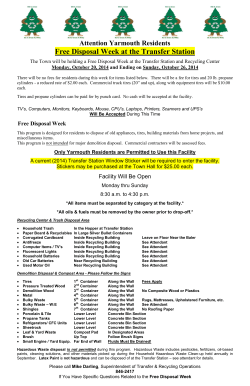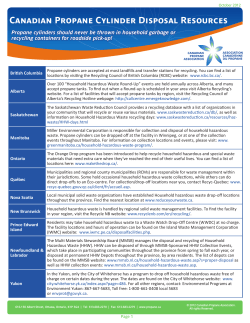
Business of Waste Recycling Dr. Prasad Modak
Business of Waste Recycling Dr. Prasad Modak Waste Generation - India • MSW generated in India 2012 – 68.8 million TPY • 50% increase in last decade • BAU scenario for 2041 – 160.5 million TPY • Class I cities contribute 72% to MSW in urban area • In 2021 towns will contribute 60% Source: Environmental Management Centre, LLP, Promoting Recycling in Municipal Solid Waste Management through Sustainable Business Models, Project Preparation Support for Livable Cities in Asia, 2012 Governance • MSW rules (Management & Handling) came in 2000 • ULBs to follow the rules • No ULB is compliant • Special rules for Biomedical waste, Ewaste and Plastics with regulatory guidelines framed for recycling of batteries and waste oil. Source: Environmental Management Centre, LLP, Promoting Recycling in Municipal Solid Waste Management through Sustainable Business Models, Project Preparation Support for Livable Cities in Asia, 2012 Waste Recycling • Waste recycling as prime strategy in sustainable waste management • Establishes waste-resource linkage • Recycling reduces operating and transport costs, emissions; creates green jobs, substitutes virgin materials and yields economic benefits. • Recycling takes place majorly in mega cities which needs to be taken to small towns and cities Source: Environmental Management Centre, LLP, Promoting Recycling in Municipal Solid Waste Management through Sustainable Business Models, Project Preparation Support for Livable Cities in Asia, 2012 New waste streams • E-Waste, biomedical or health-care waste, construction demolition waste and plastic waste • E-Waste - high generation, high value • Plastic recycling - 1777 units • C&D waste – Conversion to low cost construction materials • Problem of household hazardous waste and composting Source: Environmental Management Centre, LLP, Promoting Recycling in Municipal Solid Waste Management through Sustainable Business Models, Project Preparation Support for Livable Cities in Asia, 2012 Informal waste pickers • Informal sector recycles 70% of plastic waste and up to 56% of all recyclable waste • The informal sector in Delhi alone employs about 150,000 people • Delhi – Informal sector transports 1088TPD. Thus, ULB saves INR 795 million/year and avoids 1Million tons of CO2Eq • However waste pickers – exposed to high risk condition Source: Environmental Management Centre, LLP, Promoting Recycling in Municipal Solid Waste Management through Sustainable Business Models, Project Preparation Support for Livable Cities in Asia, 2012 Recycling of Inerts • Extent of waste segregation is low between 30 to 60% • Recycling – India 56% – Europe and US 30% • Separation of waste however needs space that is not made available as the informal sector is not recognized by the ULBs Source: Environmental Management Centre, LLP, Promoting Recycling in Municipal Solid Waste Management through Sustainable Business Models, Project Preparation Support for Livable Cities in Asia, 2012 Formal collection (mixed) Informal system (recyclables) Dhalaos Dustbins Waste pickers Municipal truck Small Kabaris Landfill Big kabaris Thiawalas Recyclers Source: CHINTAN. "Space for Waste:Planning for the Informal Recycling Sector." New Delhi, 2003 SWM system - India Houses Offices Market Hierarchy of Stakeholders in Hierarchy Informal SWM Recyclers Big Kabaris Small Kabaris Thiawalas Waste pickers Source: CHINTAN. "Space for Waste:Planning for the Informal Recycling Sector." New Delhi, 2003 Formal and Informal SWM systems Municipal activities Value chain activities Municipal activities Value chain activities Generator / end user Processor Generator / end user Processor Collection Junk shop Collection Junk shop Disposal Waste picker Disposal Waste picker Cash flow Cash flow Material flow Material flow Partial Material flow Partial Material flow Waste recycling in developing countries Waste recycling in high-Income countries Adopted from Anne Scheinberg, WIEGO, Informal Sector Integration and High Performance Recycling: Evidence from 20 Cities, Working Paper (Urban Policies) No. 23, 2012 Economic Aspects of the Informal Sector (GIZ Study) City Number Average of waste earnings pickers (Euro per day) Child Women earnings earnings (as % of men’s (% of earnings) adult) Total Total recycled recycled (formal) (informal) % % Total avoided costs for collection plus avoided costs for disposal for waste system (x Euro 1000/year) Cairo (Egypt) 40,000 4,3 - 13% 66% 14,473 Cluj –Napoca 3,226 (Romania) 6,28 - 5% 9% 63 Lima (Peru) 5,4 25% 60% of the Informal Sector 0.3%in Solid20% 15,758 Source: GTZ/CWG, Economic Aspects Waste 2007, Agnes 2009; WATSAN 2010 17,643 87% City with No Landfill Weigh bridge Inert Storage Sorting Organic storage Bio-methanation or Composting plants Waste Generators/ Users Waste Sorting Centre Innovation centre Street lights Waste Sorting Centres Material Recycling Hub Gardens Methane gas for street lights and to fuel transport vehicles Processed materials for users Compost to gardens Solid waste management in Bangladesh 1995 Waste Concern starts pilot community based resource recovery project in Dhaka 1997 1998 Regional Urban Developmen t Office (RUDO)South Asia supports to increase the capacity of the project and to further test the model With support from MoEF, UNDP, Waste Concern under SEMP selected to replicate the model in 5 (five) communities of Dhaka City 1999 Partnership agreement signed between public-private sectorcommunity to implement the project 2000 Replication of the model in Dhaka, Khulna& Sylhet cities. 2004 38 replications of this model in more than 18 cities/ towns of Bangladesh Source: Solid Waste Management system in Bangladesh, http://www.unescap.org/pdd/prs/ProjectActivities/Ongoing/Best%20practice/Bangladesh.pdf Composting • Organic compost - Nitrogen, Phosphorous and Potassium, and other essential micro nutrients. • India – centralized and decentralized • Potential - 4.3 million tons of compost each year from MSW • Compost sold to city gardens and residential areas • 70 centralized plants in India • Decentralized plants are getting implemented but need to be promoted • Segregation at source is the key Source: Environmental Management Centre, LLP, Promoting Recycling in Municipal Solid Waste Management through Sustainable Business Models, Project Preparation Support for Livable Cities in Asia, 2012 Waste to energy • Waste to energy business in India looks at four routes – – – – Biomethanation focusing on organic fraction Refuse Derived Fuels (RDFs) Direct combustion or Mass burn Landfill Gas (LFG) Recovery Source: Environmental Management Centre, LLP, Promoting Recycling in Municipal Solid Waste Management through Sustainable Business Models, Project Preparation Support for Livable Cities in Asia, 2012 Biomethanation • Decentralized – cooking fuel • Fuel – to – electricity for commercial units -Business models not still attractive • Bio-gas used to “fuel” buses – Swedish technology – Pilots proposed in Mysore Source: Environmental Management Centre, LLP, Promoting Recycling in Municipal Solid Waste Management through Sustainable Business Models, Project Preparation Support for Livable Cities in Asia, 2012 RDF • RDF an alternative to coal • India – 2.48 million TPY of RDF, 8 RDF facilities (Four not in working conditions) • Hyderabad & Vijaywada – Electricity generation • Jaipur & Chandigarh – Fuel for cement kilns Source: Environmental Management Centre, LLP, Promoting Recycling in Municipal Solid Waste Management through Sustainable Business Models, Project Preparation Support for Livable Cities in Asia, 2012 Mass – burn plants • Not present in India • Use of high temperature technologies such as Plasma Arc • Barriers – high capital costs, – need of auxiliary fuel – high costs of emission control and monitoring and resistance from local neighborhood and environmental groups Source: Environmental Management Centre, LLP, Promoting Recycling in Municipal Solid Waste Management through Sustainable Business Models, Project Preparation Support for Livable Cities in Asia, 2012 LFG • LFG recovery – Ahmedabad, Delhi, Mumbai, Kolkata • 7 LGFs potential in India - 7.4 million tons of CO2 equivalent emission reduction • Gorai - GHG emissions reduction of 2.2 million tons of CO2 equivalents by 2028 Source: Environmental Management Centre, LLP, Promoting Recycling in Municipal Solid Waste Management through Sustainable Business Models, Project Preparation Support for Livable Cities in Asia, 2012 Landfill mining • Recovering valuable materials from land filled MSW – Landfill mining • Prime objective – To clear space or incoming land • Still an untapped resource of economic gains, resource saving, generating employment, reduce risks to neighborhood environment • Business models not yet established Source: Environmental Management Centre, LLP, Promoting Recycling in Municipal Solid Waste Management through Sustainable Business Models, Project Preparation Support for Livable Cities in Asia, 2012 Observation • India - WTE market not yet mature, High capital costs, environmental and social concerns • Biomethanation – attractive choice • LFG – Still unexplored on larger scale, attractive with accrual of carbon credits Source: Environmental Management Centre, LLP, Promoting Recycling in Municipal Solid Waste Management through Sustainable Business Models, Project Preparation Support for Livable Cities in Asia, 2012 40 waste Recycling Companies contacted E-coli Waste 1. Profile E-coli waste is a profit organization deals with E-waste and Biomedical waste in Ahmadabad. They follow collect-segregate-process-sell operation. E.coli Waste Management Company has signed MOU with Government of Gujarat for recycling the e-waste generated by corporate¸ small entities and individuals due to dumping of electric and electronic equipments like mobiles, computers¸ ACs etc. .. Photo Highlight 2. Impact At E-Coli waste management system the collection of Bio-medical waste is done in accordance with direction contained in the notification of BMW rules as per the provisions of the BMW rules '98 - BY (GPCB). They provides technical as well as legal guidelines to institute for safe collection, storage & disposal of biomedical waste as well as necessary statutory requirement of State Pollution Control Board as per BMW rules. 3. Contact Website http://www.ecoliwaste.com Email iinfo@ecoliwaste.com Number 079-27556348 9825494049 Place: Contact Person They claim as the only company of Gujarat which is actively involved in recycling of e-waste in a systematic & eco-friendly manner following the safety norms set by the pollution control board. THANK YOU…
© Copyright 2025











